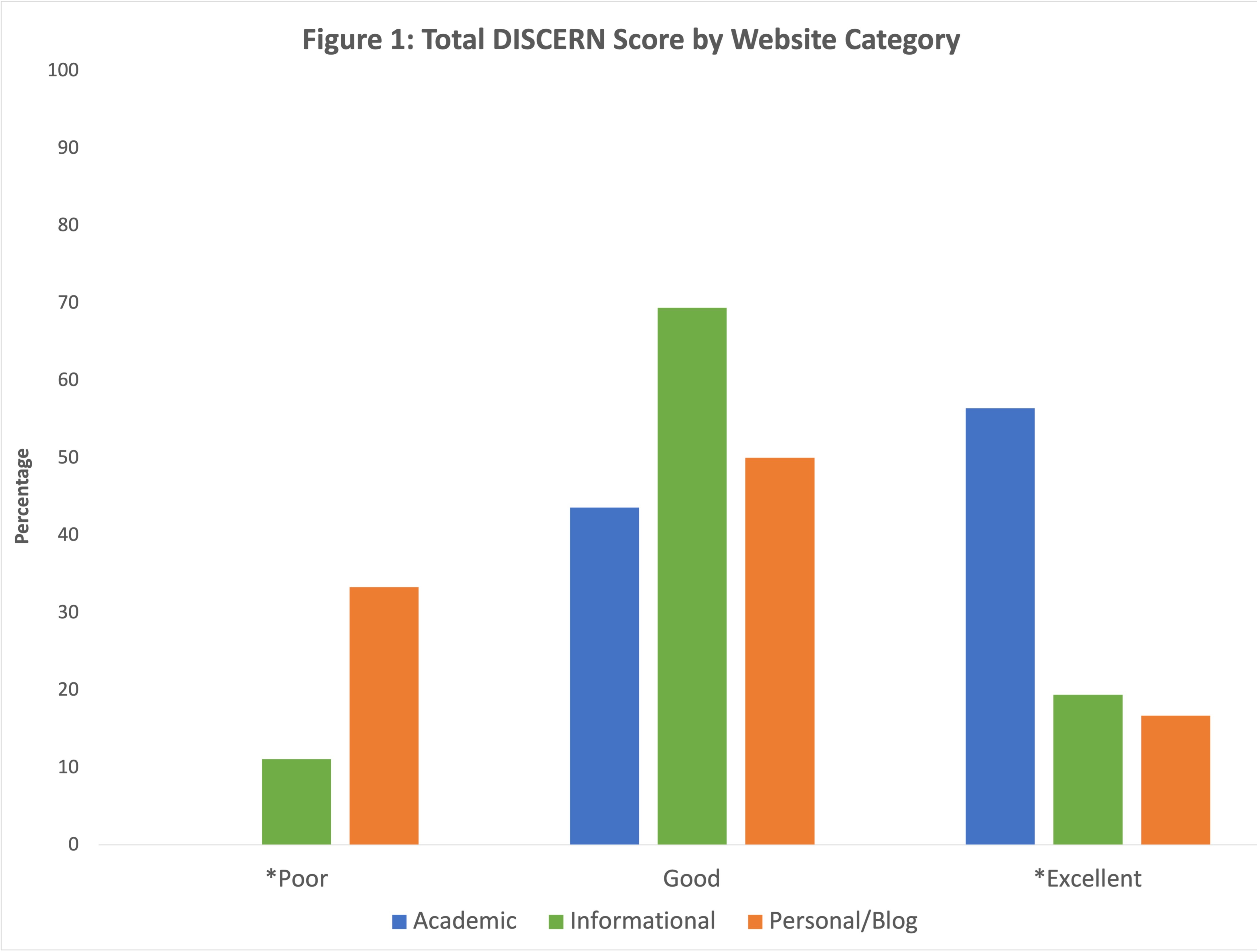Back
Poster Session E - Tuesday Afternoon
E0357 - Evaluating the Quality and Readability of Online Information Regarding Contraceptive Use in IBD
Tuesday, October 25, 2022
3:00 PM – 5:00 PM ET
Location: Crown Ballroom

Vinay Rao, MD
Thomas Jefferson University Hospital
Philadelphia, PA
Presenting Author(s)
Vinay Rao, MD, Lauren T. Lally, MD, Sahaj Mujumdar, MD, Salil Chowdhury, MD, Maria Winte, MD, Raina Shivashankar, MD
Thomas Jefferson University Hospital, Philadelphia, PA
Introduction: Women with inflammatory bowel disease (IBD) are often of childbearing age and discussions about contraception are an important aspect of their healthcare. Patients with IBD are increasingly turning to the internet for their information. This study sought to evaluate the quality and readability of online information related to contraception use in IBD patients.
Methods: Google search engine was used to query “inflammatory bowel disease and contraception” to access the first 100 websites. Websites that were non-accessible, duplicates or videos without transcripts were excluded. Websites were categorized as academic/professional, informational, personal/blog or commercial. Quality of information was determined using the validated DISCERN score. Readability was determined using the validated Flesch-Kincaid Grade Level (FKGL) calculation. Acknowledgment of areas of uncertainty and references cited were noted. Statistical analysis was performed using ANOVA and two-tailed Fisher-Freeman-Halton exact testing with significance set at p< 0.05.
Results: Eighty-three of 100 websites met the inclusion criteria. 39(47.0%) were academic, 36(43.4%) informational, 6(7.2%) personal and 2(2.4%) commercial. The average FKGL was 11.7 with a significantly higher grade for academic websites compared to informational or personal (13.4 vs 10.4 and 8.9; p=0.00001). The mean DISCERN was “Good” with a score of 49.0; academic websites had a significantly higher DISCERN than informational or personal (56.3 vs 46.9 and 43.8; p=0.0002). Academic websites had significantly more “Excellent” DISCERN scores than informational or personal (73.3% vs 23.3% and 16.7%; p=0.002) while personal websites had significantly more “Poor” DISCERN scores (33.3% vs 0% and 11.1%; p=0.007) (Figure 1). Areas of uncertainty (82.1% vs 55.6% and 16.7%; p=0.002) and cited references (100% vs 44.4% and 66.7%; p=0.00001) were addressed more so in academic websites compared to other websites.
Discussion: Our study shows that academic resources on IBD and contraception are of higher quality than either informational or personal/blog websites; also academic resources present more comprehensive and unbiased information. However, the reading level of all categories, particularly academic, is largely inaccessible to the average consumer. As the use of online resources for contraception in IBD continues to increase, further efforts should focus on developing information that is both more accessible and of higher quality.

Disclosures:
Vinay Rao, MD, Lauren T. Lally, MD, Sahaj Mujumdar, MD, Salil Chowdhury, MD, Maria Winte, MD, Raina Shivashankar, MD. E0357 - Evaluating the Quality and Readability of Online Information Regarding Contraceptive Use in IBD, ACG 2022 Annual Scientific Meeting Abstracts. Charlotte, NC: American College of Gastroenterology.
Thomas Jefferson University Hospital, Philadelphia, PA
Introduction: Women with inflammatory bowel disease (IBD) are often of childbearing age and discussions about contraception are an important aspect of their healthcare. Patients with IBD are increasingly turning to the internet for their information. This study sought to evaluate the quality and readability of online information related to contraception use in IBD patients.
Methods: Google search engine was used to query “inflammatory bowel disease and contraception” to access the first 100 websites. Websites that were non-accessible, duplicates or videos without transcripts were excluded. Websites were categorized as academic/professional, informational, personal/blog or commercial. Quality of information was determined using the validated DISCERN score. Readability was determined using the validated Flesch-Kincaid Grade Level (FKGL) calculation. Acknowledgment of areas of uncertainty and references cited were noted. Statistical analysis was performed using ANOVA and two-tailed Fisher-Freeman-Halton exact testing with significance set at p< 0.05.
Results: Eighty-three of 100 websites met the inclusion criteria. 39(47.0%) were academic, 36(43.4%) informational, 6(7.2%) personal and 2(2.4%) commercial. The average FKGL was 11.7 with a significantly higher grade for academic websites compared to informational or personal (13.4 vs 10.4 and 8.9; p=0.00001). The mean DISCERN was “Good” with a score of 49.0; academic websites had a significantly higher DISCERN than informational or personal (56.3 vs 46.9 and 43.8; p=0.0002). Academic websites had significantly more “Excellent” DISCERN scores than informational or personal (73.3% vs 23.3% and 16.7%; p=0.002) while personal websites had significantly more “Poor” DISCERN scores (33.3% vs 0% and 11.1%; p=0.007) (Figure 1). Areas of uncertainty (82.1% vs 55.6% and 16.7%; p=0.002) and cited references (100% vs 44.4% and 66.7%; p=0.00001) were addressed more so in academic websites compared to other websites.
Discussion: Our study shows that academic resources on IBD and contraception are of higher quality than either informational or personal/blog websites; also academic resources present more comprehensive and unbiased information. However, the reading level of all categories, particularly academic, is largely inaccessible to the average consumer. As the use of online resources for contraception in IBD continues to increase, further efforts should focus on developing information that is both more accessible and of higher quality.

Figure: Figure 1: Total DISCERN Score by Website Category (* denotes a statistically significant difference in total DISCERN score [Poor, Good, Excellent] among website categories)
Disclosures:
Vinay Rao indicated no relevant financial relationships.
Lauren Lally indicated no relevant financial relationships.
Sahaj Mujumdar indicated no relevant financial relationships.
Salil Chowdhury indicated no relevant financial relationships.
Maria Winte indicated no relevant financial relationships.
Raina Shivashankar: Abbvie – Grant/Research Support, Speakers Bureau. Janssen – Advisory Committee/Board Member, Grant/Research Support.
Vinay Rao, MD, Lauren T. Lally, MD, Sahaj Mujumdar, MD, Salil Chowdhury, MD, Maria Winte, MD, Raina Shivashankar, MD. E0357 - Evaluating the Quality and Readability of Online Information Regarding Contraceptive Use in IBD, ACG 2022 Annual Scientific Meeting Abstracts. Charlotte, NC: American College of Gastroenterology.

